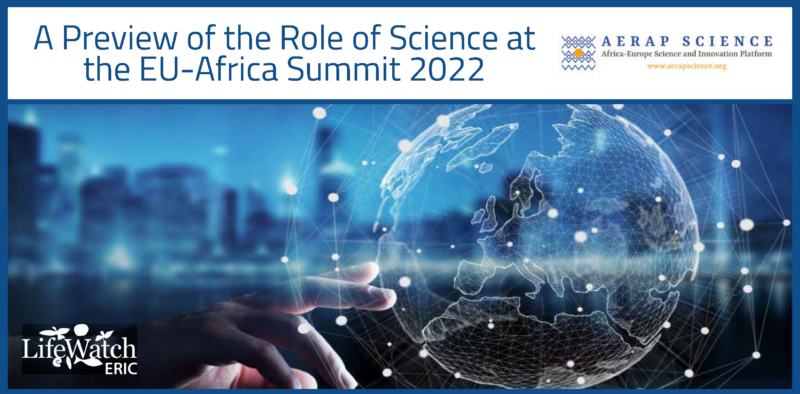
On 8–9 December 2021, AERAP Science (the Africa-Europe Science and Innovation Platform) hosted the round-table session “A preview on the Role of Science at the EU-Africa Summit 2022”, to consider the contribution of science to the priorities for the EU-Africa Summit on 17–18 February 2022 in Brussels. In his contribution, Dr Juan Miguel González-Aranda, LifeWatch ERIC CTO and ERIC Forum Executive Board Member, addressed the necessity of establishing an EU-AFRICA e-Biodiversity network, in order to accomplish the Sustainable Development Goals regarding the sustainable provision of ecosystem services.
For more information on this event, please see the AERAP article.
Full participant list:
Orla Feely – Vice President for Research, Innovation & Impact (VPRII), University College Dublin, Ireland
Erik Hansalek – Federal Ministry of Education and Research (BMBF), Germany
Racey Muchilwa – Head of Novartis, Sub Saharan Africa (SSA), Novartis, Kenya
Daan du Toit – Deputy Director-General: ICR, Department of Science and Innovation, South Africa
Maria Cristina Russo – Director for Global Approach and International Cooperation in R&I at European Commission, European Commission, Belgium
Mahama Ouedraogo – Director, Science and Technology Department, African Union Commission, Ethiopia
Shamila Nair-Bedouelle – Assistant Director-General for Natural Sciences, UNESCO, France
Jean-Pierre Bourguignon – Institut des hautes études scientifiques (IHES), France
Juan Miguel González-Aranda – LifeWatch ERIC Chief Technology Officer & ERIC FORUM Executive Board Member
Michael Makanga – Director, European Developing Countries Clinical Trials Partnership (EDCTP), Netherlands
Raham Rachdi – USPA, Paris
Rahel Belete – Kilimanjaro Innovation Hub, Ethiopia
Djime Adoum – Director General, Sahel Coalition, Chad
Bernd Halling – Head of Corporate Strategy, Bayer AG
Intisar Soghayroun – Minister, Ministry of Higher education and Scientific Research, Sudan